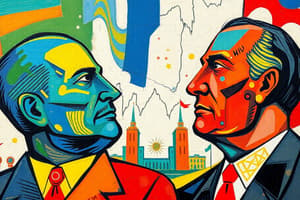Podcast
Questions and Answers
Which economic system is characterized by the private ownership of production and a free market economy?
Which economic system is characterized by the private ownership of production and a free market economy?
- Capitalism (correct)
- Communism
- Fascism
- Socialism
What is the primary goal of the communist ideology?
What is the primary goal of the communist ideology?
- To achieve economic equality through the redistribution of wealth (correct)
- To create a class-based society
- To promote individual freedom and entrepreneurship
- To maintain the status quo of power and wealth
In which century did socialism emerge as a political ideology?
In which century did socialism emerge as a political ideology?
- 19th century (correct)
- 21st century
- 18th century
- 20th century
Who is credited with coining the term 'feminism' and advocating for women's suffrage?
Who is credited with coining the term 'feminism' and advocating for women's suffrage?
What is the key difference between equity and equality?
What is the key difference between equity and equality?
Where did liberalism originate?
Where did liberalism originate?
What is the primary goal of liberalism in governance?
What is the primary goal of liberalism in governance?
What is a major criticism of capitalism?
What is a major criticism of capitalism?
What is a characteristic of fascist regimes?
What is a characteristic of fascist regimes?
Why is socialism considered a more equitable system than capitalism by some?
Why is socialism considered a more equitable system than capitalism by some?
What is a challenge faced by socialist economies?
What is a challenge faced by socialist economies?
Why does fascism appeal to certain segments of society during times of economic crisis?
Why does fascism appeal to certain segments of society during times of economic crisis?
Flashcards
Liberalism's Goal
Liberalism's Goal
Individual rights and freedoms
Communism's Goal
Communism's Goal
Economic equality through wealth redistribution
Socialism's Principle
Socialism's Principle
Collective ownership of production.
Fascism's Trait
Fascism's Trait
Signup and view all the flashcards
Capitalism's Core
Capitalism's Core
Signup and view all the flashcards
Feminism's Scope
Feminism's Scope
Signup and view all the flashcards
Ideology Definition
Ideology Definition
Signup and view all the flashcards
Equity vs. Equality
Equity vs. Equality
Signup and view all the flashcards
Communism's figures
Communism's figures
Signup and view all the flashcards
Socialism's Emergence
Socialism's Emergence
Signup and view all the flashcards
Key Difference in Capitalism
Key Difference in Capitalism
Signup and view all the flashcards
Problem facing Socialism
Problem facing Socialism
Signup and view all the flashcards
Study Notes
Liberalism
- Primary goal: individual rights and freedom
- Emerged as a response to absolutist monarchies in Europe to advocate for individual rights and freedoms against oppressive rulers
Communism
- Key figures: Karl Marx and Friedrich Engels
- Emphasizes the redistribution of wealth to achieve economic equality
- Gained popularity in the early 20th century in response to perceived injustices and inequalities under capitalist systems
Socialism
- Emerged as a political ideology in the 19th century
- Differs from capitalism in terms of ownership of production: collective ownership in socialist economies, private ownership in capitalist economies
- Advocates for a classless society where the means of production are owned collectively
- Faces challenges in promoting innovation and entrepreneurship due to lack of competition and profit motive
- Would be most effective in addressing poverty through government intervention
Fascism
- Prioritizes nationalism and authoritarianism to suppress dissent and opposition
- Appealed to certain segments of society during times of economic crisis due to its promise of strong leadership and national unity
- Rose to prominence in Europe, particularly in Italy and Germany in the early 20th century
Capitalism
- Fundamental principle: private ownership of production and free market economy
- Associated with the concept of the "free market" due to its encouragement of competition and minimal government regulation
- Criticized for exacerbating income inequality due to its focus on profit maximization and wealth accumulation
- First emerged as a dominant economic system in Ancient Greece
Feminism
- Multifaceted ideology encompassing various perspectives and movements
- Addresses the intersectionality of gender with race, class, and other identities
- Principles can be applied in addressing gender inequalities in education by advocating for equal access to education for all genders
- Term "feminism" was coined by Susan B. Anthony, who advocated for women's suffrage in the early 20th century
General Concepts
- Ideology: a system of ideas and ideals forming the basis of economic or political theory
- Key difference between equity and equality: equity emphasizes fairness, while equality emphasizes sameness
Studying That Suits You
Use AI to generate personalized quizzes and flashcards to suit your learning preferences.




